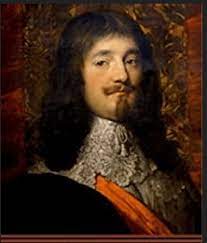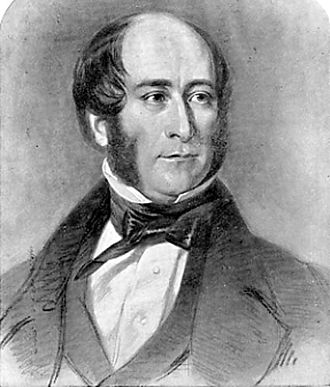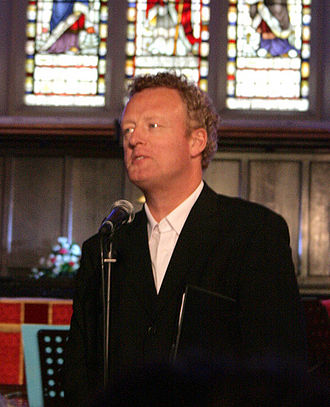The Lord is my shepher (Psalm 23) Howard Goodall
Personal life
Born in Bromley, Kent, Goodall was educated at New College School, where he was a chorister in the Choir of New College, Oxford. He then went on to Stowe School and Lord Williams's School. He read music at Christ Church, Oxford, where he gained a first-class degree.
He is married to Val Fancourt, who is a classical music agent, and they have two daughters.
Works
Popular music
In the late 1970s, Goodall was a member of the band Half Brother with his friend Jonathan Kermode. They produced an eponymous LP album, Half Brother, in 1978.
Musical theatre
Goodall's 1984 musical The Hired Man, an adaptation of the novel by Melvyn Bragg, won an Ivor Novello award (1985) and TMA Award (2006) award for Best Musical. Professional revivals of The Hired Man in recent years include a UK tour by the New Perspectives Theatre Company in 2008 and a production directed by David Thacker and Elizabeth Newman at the Octagon Theatre, Bolton in June 2010.
A Winter's Tale, commissioned for the opening of the Sage Gateshead in December 2005 was presented during 2009/10 by Youth Music Theatre UK. In 2011 its London professional premiere at the Landor Theatre won the Off west end award for Best New Musical.
Love Story, based on the novella by Erich Segal, premiered in 2010 at the Minerva Theatre, Chichester.
Bend It Like Beckham: The Musical, written with Gurinder Chadha, Paul Mayeda Berges and Charles Hart began previewing at the Phoenix Theatre, London, in May 2015.
Other musicals include Girlfriends (1986), Days of Hope (1991), Silas Marner (1993), The Kissing-Dance (1998), The Dreaming (2001) (both with Charles Hart), A Winter's Tale (2005) and Two Cities (2006).
Television
Goodall has composed the main themes and incidental music for UK comedy programmes including Red Dwarf, Blackadder, Mr. Bean, The Thin Blue Line, The Vicar of Dibley, The Catherine Tate Show, 2point4 Children, Words and Pictures and QI, on which he has also appeared twice as a panellist. A single "Tongue Tied" from Red Dwarf reached no. 17 on the UK charts.
As an undergraduate at Christ Church, Oxford, Goodall met actor Rowan Atkinson and writer Richard Curtis, his collaborators on several of these projects, including his first break into TV, Not the Nine O'Clock News.
Choral works
Goodall has a body of choral music to his name, including "In Memoriam Anne Frank" (2001), "O Lord God of Time and Eternity" (2003) and settings of Psalm 23 (used as the theme tune to The Vicar of Dibley) and "Love Divine". In September 2008, his Eternal Light: A Requiem was premiered by Rambert Dance Company to choreography by the company's artistic director, Mark Baldwin. The result of a commission from London Musici to celebrate its 20th anniversary, Eternal Light: A Requiem was commissioned as both a choral-orchestral-dance piece and a choral orchestral work. The London premiere took place on 11 November 2008 at Sadler's Wells with Rambert Dance Company, London Musici, The Choir of Christ Church Cathedral, Oxford, Finchley Children's Music Group and soloists, conducted by Paul Hoskins. Also in September 2008, EMI Classics released the premiere recording of Eternal Light: A Requiem, with soloists Natasha Marsh, Alfie Boe and Christopher Maltman joining London Musici, The Choir of Christ Church Cathedral, Oxford, and conducted by Stephen Darlington. Eternal Light: A Requiem has now had over 400 live performances across the world.
In March 2009, Classic FM released Howard Goodall's Enchanted Voices, a modern exploration of ancient chant, scored for upper voices, cello, organ, handbells and synthesiser. The disc marks Goodall's position as Classic FM's Composer-in-Residence for 2009. A month after its UK release, it became the best-selling specialist choral CD of 2009. It subsequently earned a nomination for Classical Brit Album of the Year. Howard Goodall's Enchanted Voices was followed by Howard Goodall's Enchanted Carols (November 2009) and Pelican in the Wilderness (March 2010).
Goodall arranged an orchestral and choir score for Psalm 122 for Tonbridge School to commemorate their chapel which burnt down in the 1980s. Goodall was also commissioned by Truro Cathedral to write a new work for all four of the Cathedral's choirs: Truro Cathedral Choir (boys and men), St Mary's Singers (mixed adults), Cornwall Youth Choir and Cornwall Junior Choir. The piece, entitled A New Heart, A New Spirit, sets a text from Wisdom and Ezekiel in four languages (English, Latin, French and Cornish).
The 45-minute oratorio, Every Purpose Under the Heaven (The King James Bible Oratorio), was premiered in Westminster Abbey in November 2011 (conducted by the composer). It was commissioned as a gift to the United Church Schools Trust and United Learning Trust from Sir Ewan and Lady Harper, to mark the 400th anniversary of the King James Bible. Every Purpose Under the Heaven was recorded and released on the Decca Classics/Classics fm CD Inspired in 2012.
Goodall's commission Rigaudon was part of Queen Elizabeth II Diamond Jubilee Regatta and he was musically responsible for Rowan Atkinson's performance at the Opening Ceremony of the 2012 London Olympics.
I am Christmas Day premiered at Southwark Cathedral as part of the Mercy Ships Charity annual Carol Service on Wednesday 5 December 2012. Commissioned by Mercy Ships UK, the work was performed by Southwark Cathedral Girls Choir, conducted by the composer.
Goodall contributed two choral items for the August 4th commemoration of the beginning of the First World War at St Symphorien Military Cemetery near Mons, Belgium, broadcast live in BBC2. He arranged British and German soldiers' songs into a suite with band accompaniment (The Band of the Coldstream Guards) and composed an entirely new work in English and German, "Sure of the Sky, Sure of the Sun – Des Himmels sicher, der Sonne sicher", performed jointly by the London Symphony Chorus and the Schleswig-Holstein Festival Choir, conducted by Simon Halsey, based on the poems "May, 1915" by Charlotte Mew (1869–1928) and "An einen vermißten Freund!" by a German soldier killed in action on the Western Front, Goldfeld (discovered by Peter Appelbaum). Present at the event, alongside members of the UK Government, were the presidents of Germany and Eire, the King and Queen of the Belgians, and Prince William and Catherine and Prince Harry.
Steadfast, with music and lyrics by Goodall, was released on 14 October 2014, in aid of Global's Make Some Noise, a charity that helps disadvantaged children in the UK. Steadfast included performance contributions from Katherine Jenkins, Laura Wright, Milos, Charlie Siem, Alfie Boe, Myleene Klass and Alexander Armstrong.
More Tomorrows was commissioned by Classic fm for Cancer Research UK and premiered by the Philharmonia Orchestra at the Royal Albert Hall on 25 April 2013, conducted by the composer.
Invictus: A Passion, a 55-minute work for soloists, chorus and small orchestra, was commissioned by St Luke's United Methodist Church in Houston, Texas, and premiered there under the composer's baton in March 2018, with the UK premiere following in May 2018, given by the Choir of Christ Church Cathedral, Oxford and Stephen Darlington.
Awards
Goodall has been awarded honorary Doctorates of Music from Bishop Grosseteste University College in Lincoln, the University of Bolton, Mountview Academy of Theatre Arts with the University of East Anglia and Doctor of Literature (Education) from the Institute of Education, University College London. The British Academy of Songwriters, Composers and Authors (BASCA) gave him its Gold Badge Award for exceptional work in support of his fellow British composers. In 2007, he received the Making Music/Sir Charles Groves Prize for Outstanding Contribution to British Music and was appointed by the UK Government as England's first ever National Ambassador for Singing, leading a 4-year programme (Sing Up) to improve the provision of group singing for all primary-age children.
In April 2009, Goodall was nominated for The Classical BRITs "Composer of the Year" award for Eternal Light: A Requiem, which he won in May 2009, and in July 2009 he was nominated for an Emmy Award in the category "Music Composition for a Miniseries, Movie, or Special (Dramatic Score)" for his work on the Winston Churchill biopic Into the Storm; which he went on to win on 12 September at a ceremony in Los Angeles.
In 2009, Goodall received the Karl Haas Prize for Music Education, awarded by the Klassix Society–Friends of 88.7KXMS / Fine Arts Radio International of Missouri Southern State University.
Additional awards include the Naomi Sergeant Memorial Award for Outstanding contribution to British Music, the MIA/Classic fm award for Outstanding contribution to Music Education and a Primetime EMMY award for Original Dramatic Score for the score of the HBO film Into the Storm.
In January 2011, Goodall was appointed Commander of the Order of the British Empire (CBE) in the 2011 New Year Honours for services to music education.
Taken from wikipedia.
Psalm 23 is well known and has many settings as both motet and hymn. Howard Goodall's version was written in 1994 and first performed by the Choir of Christ Church Catherdral, Oxford. It is readily recognised as the theme tune for The Vicar of Dibley. Our arrangement was by Howard Goodall, copyright 2000.
















